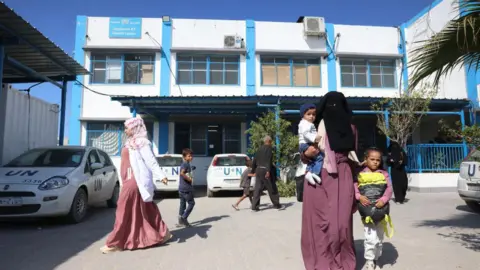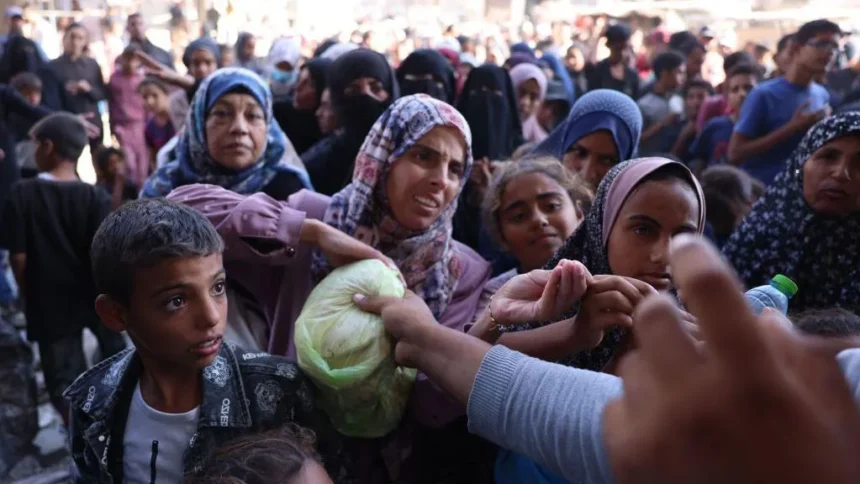Israel must immediately address the “catastrophic humanitarian situation” in Gaza, the US envoy to the UN has warned, as the deadline approaches to improve the flow of aid or face cuts to American military assistance.
“Israel’s words must be matched by action on the ground,” Linda Thomas-Greenfield said. “Right now, that is not happening.”
The US has given its ally until 12 November to “surge” all assistance, with a minimum of 350 lorries entering Gaza daily. But the UN says only 10% of that number have crossed each day on average since then.
Israel’s ambassador to the UN, Danny Danon, said it was going “above and beyond its humanitarian obligations” and blamed Hamas.
Israel’s allies have warned that Unrwa plays a critical role in delivering humanitarian assistance to Gaza, where it is the largest humanitarian organisation on the ground.
‘Unrwa means everything to us’: Gazans fear aid collapse
What is Unrwa and why has Israel banned it?
He said the north of the Palestinian territory had received virtually no humanitarian assistance since the start of October, when the Israeli military began a ground offensive in the Jabalia area that it said was aimed at stopping Hamas fighters from regrouping there.
The operation has killed scores of Palestinians, caused mass displacement and led to the closure of essential services, including water wells and medical facilities.
The US ambassador said the reports of children going days without food in Jabalia had made her think about how she had seen a girl die of starvation almost three decades ago.
Ms Thomas-Greenfield said the Biden administration had made clear to Prime Minister Benjamin Netanyahu that Israel must address the humanitarian crisis in Gaza immediately and that the US “rejects any Israeli efforts to starve Palestinians in Jabalia, or anywhere else”.
“The US has stated clearly that Israel must allow food, medicine and other supplies into all of Gaza – especially the north, and especially as winter sets in – and protect the workers distributing it,” she added.
Mr Danon told the Council that Israel had been “hard at work delivering humanitarian aid”.
“The problem isn’t the flow of aid. It is Hamas, which hijacks supplies, storing or selling them to fuel their terror machine while Gaza’s civilians are neglected. Israel remains committed to working with our partners to deliver aid to those in need,” he added.
On 13 October, the Biden administration told Mr Netanyahu’s government that Israel must act within 30 days on a series of concrete measures to boost aid supplies, citing US laws which can prohibit military assistance to countries that impede delivery of US humanitarian aid.
They included enabling a minimum of 350 lorries a day to enter through all Israeli-controlled crossings with Gaza and ending the “isolation” of the north immediately.
According to data published Unrwa, only 852 aid lorries have crossed into Gaza this month, compared with about 3,000 lorries in September. A total of 502 have entered since the letter, with an average of 35 lorries crossing each day between 14 and 29 October.
Israel’s own data, meanwhile, says a total of 1,386 lorries have crossed between 1 and 28 October – a daily average of 49. It says there are also 670 lorry loads of aid awaiting collection from inside Gaza.
 AFP
AFP“We know that right now, there is no alternative to Unrwa when it comes to delivering food and other life-saving aid in Gaza. Therefore, we have concerns about this legislation being implemented,” she said.
Mr Danon accused Unrwa of being “a terrorist front camouflaged as a humanitarian agency”, citing the involvement of a handful of its thousands of staff in the 7 October attacks on Israel.
Unrwa insists it is impartial and that the laws breach the UN charter and Israel’s obligations under international law.
On Monday, UK Foreign Secretary David Lammy said his Israeli counterpart had floated the possibility of delayed implementation of the legislation during a call at the weekend.
“When I raised this issue with Foreign Minister [Israel] Katz yesterday, he was at pains to explain that, although the Knesset could pass its bill today, that does not mean that it has to be implemented,” Mr Lammy told the UK Parliament.
But in an unusual statement sent to the BBC on Wednesday, the Israeli foreign ministry contradicted Mr Lammy’s account.
“In general, we do not refer to the content of diplomatic talks. Nevertheless, and in order to remove any doubts, it should be clarified that the description of Foreign Minister Katz’s remarks is not true and does not reflect what was said in the conversation,” it said.
“The foreign minister is, of course, committed to the implementation of the Knesset’s legislation as well as to Israel’s international humanitarian obligations.”
David Gritten


